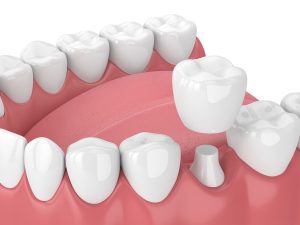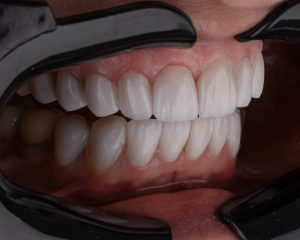Introduction
A beautiful smile can be a source of confidence and self-assurance, but dental imperfections can sometimes hinder its full potential. Fortunately, modern dentistry offers solutions like dental crowns and veneers to address a variety of aesthetic concerns. Understanding the differences, benefits, and suitability of these treatments can help individuals make informed decisions about enhancing their smiles.
What are dental crowns?
Dental crowns, also known as caps, are custom-made prosthetic restorations that encase the entire visible portion of a tooth above the gum line. They are commonly used to strengthen weakened or damaged teeth, restore functionality, and improve aesthetics. Dental crowns are crafted from durable materials such as porcelain, ceramic, metal, or a combination, offering both strength and natural-looking aesthetics.

What are the benefits of dental crowns?
- Strength and Durability: Dental crowns provide reinforcement to weakened or damaged teeth, restoring their strength and functionality for improved chewing and biting capabilities.
- Aesthetic Enhancement: Crowns can be customized to match the color, shape, and size of natural teeth, ensuring a seamless and natural-looking appearance that blends harmoniously with the surrounding dentition.
- Protection: Crowns offer protection to vulnerable teeth by providing a durable barrier against further damage, decay, or fractures, thereby preserving the overall integrity of the tooth structure.
How long do dental crowns last?
The lifespan of a dental crown can vary depending on several factors, including its placement within your mouth and the type of crown used. Different types of crowns exhibit varying levels of durability and longevity. While some crowns may endure for a lifetime, others may develop cracks or wear over time, necessitating replacement.
On average, a well-maintained crown can last between 10 and 30 years. Zirconia crowns, known for their exceptional strength and durability, often boast a longer lifespan compared to traditional porcelain or ceramic crowns. Zirconia crowns can last upwards of 15 years or more with proper care, providing patients with lasting functionality and aesthetic appeal. However, it’s important to note that individual experiences may vary, and regular dental check-ups are essential to monitor the condition of your crown and ensure its longevity.

Who is a good candidate for dental crowns?
Dental crowns are suitable for individuals with various dental concerns, including:
- Severely decayed or damaged teeth
- Cracked or fractured teeth
- Teeth with large fillings or root canal treatment
- Cosmetic imperfections such as discoloration or misalignment
What are dental veneers?
Dental veneers are thin, custom-made shells crafted from porcelain or composite resin materials. They are bonded to the front surface of teeth to improve their appearance by concealing imperfections such as stains, chips, cracks, or gaps. Veneers offer a minimally invasive and versatile solution for enhancing the aesthetics of the smile while preserving natural tooth structure.
What are benefits of dental veneers?
- Aesthetic Transformation: Veneers can dramatically enhance the appearance of the smile by correcting imperfections, improving tooth color, shape, size, and alignment.
- Minimal Tooth Preparation: Compared to dental crowns, veneers require minimal tooth preparation, preserving more natural tooth structure and offering a conservative treatment approach.
- Stain Resistance: Porcelain veneers are highly resistant to stains and discoloration, ensuring long-lasting aesthetic results and a bright, vibrant smile.
How long do dental veneers last?
Following the placement of dental veneers, individuals can expect a significantly improved smile with enhanced aesthetics and symmetry. With proper oral hygiene practices and regular dental check-ups, veneers can last for many years, providing durable and long-lasting results.
In some cases even up to 10 till 15 years.
Who is a good candidate for dental veneers?
Dental veneers are suitable for all with the following concerns:
- Discolored or stained teeth
- Chipped, cracked, or worn teeth
- Uneven or misaligned teeth
- Gaps or spaces between teeth
It’s important to note that dental veneers may not be suitable for individuals with large gaps between teeth or significant unevenness. Veneers are designed to address minor imperfections and enhance the overall appearance of the smile. Therefore, gaps between teeth should be small, and teeth should have only minor unevenness for veneers to be considered as a viable treatment option.
The reason for this limitation lies in the nature of veneers. Veneers are thin shells made of porcelain or composite resin that are bonded to the front surface of teeth to improve their appearance. They are intended to camouflage minor flaws and create a more uniform smile. If the gaps between teeth are too large or if teeth are severely misaligned, alternative treatments such as orthodontics may be necessary to achieve optimal results.
By addressing minor cosmetic concerns such as discoloration, small chips, or slight unevenness, dental veneers can effectively enhance the aesthetics of the smile and boost self-confidence. However, it’s essential to consult with a qualified dentist to determine the most appropriate treatment plan based on individual needs and expectations.

What is the difference between dental crowns and veneers?
- Material: Dental crowns are typically thicker and cover the entire tooth, while veneers are thinner and cover only the front surface.
- Tooth Preparation: Crowns require more tooth preparation, including reshaping and reduction, whereas veneers involve minimal tooth preparation.
- Functionality: Crowns provide structural support and reinforcement to weakened teeth, while veneers primarily focus on aesthetic enhancement.
- Indications: Crowns are suitable for restoring severely damaged teeth, while veneers are ideal for improving the appearance of healthy but cosmetically flawed teeth.
Conclusion
Dental crowns and veneers offer effective solutions for enhancing the aesthetics and functionality of the smile, addressing a wide range of dental concerns with tailored treatment approaches. Whether seeking to strengthen weakened teeth with crowns or achieve a radiant smile transformation with veneers, individuals can benefit from consulting with a qualified dentist to explore their options and create a personalized treatment plan. With the advancements in cosmetic dentistry, achieving a beautiful and confident smile is within reach for individuals of all ages.
Disclaimer: The content on this blog is intended for general informational purposes only. It is not a substitute for professional medical advice, diagnosis, or treatment. Always consult qualified healthcare providers for personalized advice. Information regarding plastic surgery, dental treatment, hair transplant, and other medical procedures is educational and not a guarantee of results. We do not assume liability for actions taken based on blog content. Medical knowledge evolves; verify information and consult professionals. External links do not imply endorsement. By using this blog, you agree to these terms.





